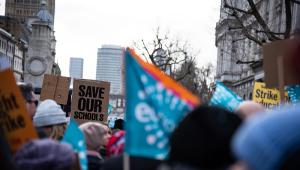30 January 2009
By Tash Shifrin
Public services face the prospect of a three-year real-terms spending freeze from 2010 as the government attempts to get its finances back on track, the Institute for Fiscal Studies has warned.
In its annual Green Budget, the IFS also offered a gloomy assessment of the long-term state of the public finances in the wake of the current economic crisis.
The economists' grim analysis came as speculation increased that the government might soon launch a second fiscal stimulus package to shore up the worsening economy – with the International Monetary Fund warning that the UK economy would shrink by 2.8% next year, more than any other advanced country.
The possibility that this year's Budget might be deferred until after the G20 gathering in early April was also rumoured this week.
The IFS said the government would need tax increases or spending cuts worth an extra £20bn a year by the end of the next Parliament, to 'repair the public finances as planned in November's Pre-Budget Report'.
It added: 'Even if [the government] acts, public sector debt may well not return to pre-crisis levels for more than 20 years.'
The PBR had signalled a reduction in public spending growth from 1.9% a year to 1.1% from 2011/12 in an attempt to restore the public finances when the economy recovers. This would wipe a total of £37bn from planned public spending.
But the Green Budget, published on January 28, spelled out what this meant, noting that government projections for public spending growth in the next Spending Review period showed much slower growth than its previous reviews – 'and slower than under the 18 years of Conservative governments'.
The squeeze on Whitehall departments might be 'even more severe' because of unavoidable spending commitments such as social security benefits and debt interest payments.
'Total departmental spending may well have to be frozen in real terms over the three years,' it warned. 'In that event, most departments are likely to see real cuts, with only high priorities such as health and education being allocated any real growth.'
Capital-intensive areas, such as transport and housing, would be hardest hit because of the planned freeze on investment spending.
The IFS said the squeeze would put major government policies at risk. 'Earnings indexation of the basic state pension is likely to be delayed, pushing up pensioner poverty. The government is also projected to miss its child poverty target for 2010... and it could stay above the target for some time after 2010/11.'
The economists also sounded a death knell for one of the government's once-cherished fiscal rules: that debt should be kept below 40% of national income. That rule was suspended by Chancellor Alistair Darling in the PBR and the ceiling has been decisively breached, with the figure hitting 47.5% in December.
But the IFS said that the need to retain fiscal tightening 'until the early 2030s' before debt returned to levels below 40% meant there was 'no prospect of a government being able to readopt these rules any time soon'.
A report on the PBR from the Commons Treasury select committee, published on January 28, added to the criticism, questioning the chancellor's plan to make an additional £5bn public sector efficiency savings in the current Spending Review period.
Darling's announcement had been made 'without any supporting schedule showing the derivation of this figure', the report said. It called on the government to give 'details of where and how the additional savings will be made' and to set out measures 'to ensure that public service delivery does not deteriorate'.
Opposition politicians also renewed their attacks on the government's handling of the economy. Liberal Democrat Treasury spokesman Vince Cable said: 'It is clear that the temporary VAT cut has been both expensive and useless. Any fiscal stimulus should concentrate on important capital projects, which create jobs today and benefit the county for the future.'
Shadow chancellor George Osborne said the IFS report confirmed his party's claims that 'thanks to Gordon Brown's reckless borrowing, families are facing a future of higher taxes under Labour and high debt for a generation to come'.
And he signalled that public services could pay a higher price under a Tory administration. 'There is a choice – spending restraint with the Conservatives or higher taxes under Gordon Brown,' he said.
Financial secretary to the Treasury Stephen Timms defended ministers' actions, saying they were 'very, very determined and committed to making sure that we manage the public finances prudently'. That was why the PBR had set out 'how we're going to get back to balance by 2015', he said.
But he added: 'Now if by the time we get to the Budget, there have been changes in the numbers then those will be reflected in the forward path we set out.' Arguing the need for the forthcoming spending squeeze, Timms said it was 'right at a time like this for the public sector to tighten its belt'.
PFjan2009



















